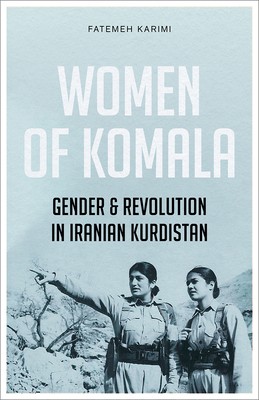
- We will send in 10–14 business days.
- Author: Fatemeh Karimi
- Publisher: Pluto Press (UK)
- ISBN-10: 0745350828
- ISBN-13: 9780745350820
- Format: 14 x 21.6 x 2.3 cm, minkšti viršeliai
- Language: English
- SAVE -10% with code: EXTRA
Reviews
Description
Kurdistan has a storied and turbulent past, marked by a relentless struggle for autonomy and survival. Kurdish women have been at the forefront of this struggle: their lives are a testament to resilience in the face of relentless adversity as they navigate the complexities of revolution and the quest for self-determination. This groundbreaking book is the first comprehensive study of leftist women guerrillas in Iranian Kurdistan, predating the emergence of women fighters in Rojava by nearly a decade. Focusing on Komala (1979-1991), a radical Kurdish-Iranian organization known for including women as combatants, Women of Komala examines marginalized women's lives and political participation. Drawing on extensive interviews with former members, the book provides a profound analysis of subjects rarely addressed within Kurdish political confederations, including familial, social, and administrative obstacles, gendered dynamics, patriarchy, the issue of children, and the sexual division of roles within families. This rich account situates Komala within the political context of the 1979 Revolution, shedding light on the importance of critically reflecting on gender relations during this pivotal period.
EXTRA 10 % discount with code: EXTRA
The promotion ends in 24d.01:14:11
The discount code is valid when purchasing from 10 €. Discounts do not stack.
- Author: Fatemeh Karimi
- Publisher: Pluto Press (UK)
- ISBN-10: 0745350828
- ISBN-13: 9780745350820
- Format: 14 x 21.6 x 2.3 cm, minkšti viršeliai
- Language: English English
Kurdistan has a storied and turbulent past, marked by a relentless struggle for autonomy and survival. Kurdish women have been at the forefront of this struggle: their lives are a testament to resilience in the face of relentless adversity as they navigate the complexities of revolution and the quest for self-determination. This groundbreaking book is the first comprehensive study of leftist women guerrillas in Iranian Kurdistan, predating the emergence of women fighters in Rojava by nearly a decade. Focusing on Komala (1979-1991), a radical Kurdish-Iranian organization known for including women as combatants, Women of Komala examines marginalized women's lives and political participation. Drawing on extensive interviews with former members, the book provides a profound analysis of subjects rarely addressed within Kurdish political confederations, including familial, social, and administrative obstacles, gendered dynamics, patriarchy, the issue of children, and the sexual division of roles within families. This rich account situates Komala within the political context of the 1979 Revolution, shedding light on the importance of critically reflecting on gender relations during this pivotal period.


Reviews